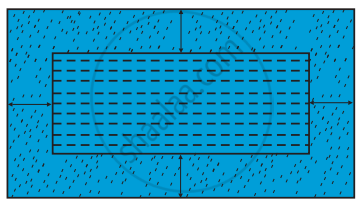Advertisements
Advertisements
प्रश्न
The sum of the squares two consecutive multiples of 7 is 1225. Find the multiples.
उत्तर
Let the required consecutive multiplies of 7 be 7x and 7(x+1)
According to the given condition,
`(7x)^2+[7(x+1)]^2=1225`
⇒`49x^2+49(x^2+2x+1)=1225`
⇒`49x^2+49x^2+98x+49=1225`
⇒`98x^2+98x-1176=0`
⇒`x^2+x-12=0`
⇒`x^2+4x-3x-12=0`
⇒`x(x+4)-3(x+4)=0`
⇒`(x+4)(x-3)=0`
⇒`x+4=0 or x-3=0`
⇒`x=-4 or x=3`
∴x=3 (Neglecting the negative value)
When x=3,
`7x=7xx3=21`
`7(x+1)=7(3+1)=7xx4=28`
Hence, the required multiples are 21 and 28.
APPEARS IN
संबंधित प्रश्न
Solve for x : `(x+1)/(x-1)+(x-1)/(x+2)=4-(2x+3)/(x-2);x!=1,-2,2`
Solve the following quadratic equations by factorization:
`1/((x-1)(x-2))+1/((x-2)(x-3))+1/((x-3)(x-4))=1/6`
Solve the following quadratic equations by factorization:
`x^2+(a+1/a)x+1=0`
The sum of the squares of the two consecutive odd positive integers as 394. Find them.
The sum of the squares of three consecutive natural numbers as 149. Find the numbers
Two pipes running together can fill a tank in `11 1/9` minutes. If one pipe takes 5 minutes more than the other to fill the tank separately, find the time in which each pipe would fill the tank separately.
Solve the following equation by factorization
3(y2 – 6) = y(y + 7) – 3
The hypotenuse of grassy land in the shape of a right triangle is 1 metre more than twice the shortest side. If the third side is 7 metres more than the shortest side, find the sides of the grassy land.
A natural number, when increased by 12, equals 160 times its reciprocal. Find the number.
In the centre of a rectangular lawn of dimensions 50 m × 40 m, a rectangular pond has to be constructed so that the area of the grass surrounding the pond would be 1184 m2 [see figure]. Find the length and breadth of the pond.
